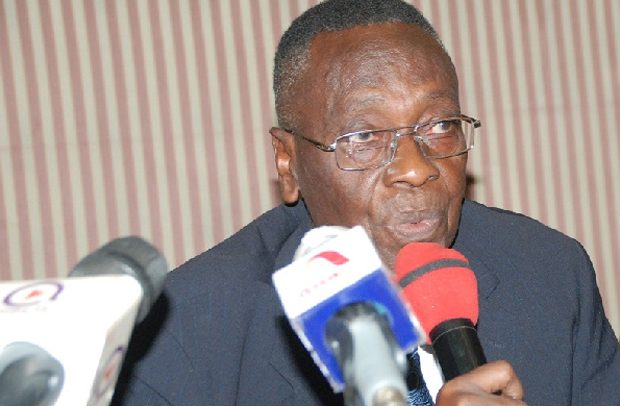Justice Stephen Alan Brobbey
A FORMER Supreme Court judge, Justice Stephen Alan Brobbey, has called for a review of the 1992 Constitution especially, the amendment of the powers of the President which has been described by many as “excessive”, to meet the exigencies of current times.
Speaking at the Institute of Economic Affairs (IEA), as part of a series of lectures organised by the Rt. Hon. Prof. Mike Oquaye Centre for Constitutional Studies on the theme: “Local Government, Chieftaincy and Constitution,” he said the 1992 Constitution originated from the American system of government where the President wields so much power, and also the authority of chiefs in the hierarchy of the traditional system of governance.
This misconception, he stated, influenced the framers of the constitution to follow suit in an attempt to make traditional institutions powerful.
He said, “Now the Presidential powers are served from the misconception of the American government. They think that American President is strong. He can command a lot of things and that is what they need in Africa, it also originates from our traditional set up. If you go to any village, the chief is number one and he is the most powerful and most important person, and we thought that our political system should follow suit.
“If it turns out that it doesn’t work, that’s why we are here, change it, but we had reasons for doing that. I think we were trying to follow the American system and also follow our traditional set up which says the head must be able to rule but now see what is happening?”
Justice Brobbey, who was the chairman of the Drafting and Legal Committee of the Constituent Assembly that crafted the 1992 Constitution 30 years ago, said the constitution was crafted in the best interest of the country by 261 stakeholders who represented various bodies from all parts of the country to return Ghana to constitutional rule after it had been toppled by the PNDC.
He mentioned that provisions stated in the constitution were views of those representatives which included TUC, UTAG, Ghana Bar Association, NUGS, Ghana Medical Association, GNAT, Institute of Surveyors, Ghana Police Service, the Ghana Armed Forces, Traditional Healers Association, Butchers Association, Chopbar Keepers, Drinking Bar Operators Association and many others who endorsed decisions proposed using majority rule.
He noted that it was important for Ghanaians to appreciate that the current constitution was written by a conglomerate of people from all over the country with the uppermost objective of a constitution for future civilian governments and how governments should rule in Ghana and, therefore, a review should critically look at why certain provisions should be amended.
“It was a question of majority carries the vote and majority did carry the vote, and if the majority view was what you saw out there, and as the last person to authorise the print had no mandate to change anything, so after 30 years the question is: is the constitution in the best interest of Ghanaians? If it is, leave it there; if it is not, amend it, and once you review this constitution you can trust that the next ten, twenty years, nobody will touch it,” he added.
BY Ebenezer K. Amponsah


